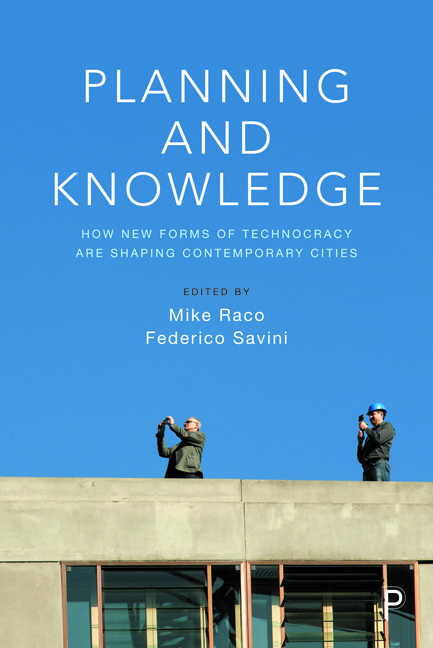Book contents
- Frontmatter
- Contents
- List of figures
- List of tables
- Notes on contributors
- Part I Conceptual framings of technocracy
- Part II Public planning and bureaucracies in contemporary urban development politics
- Part III Corporate knowledge and the land and property development sector
- Part IV Private consultants and the delivery of public policy
- Part V New constellations of actors and the management and governance of contemporary cities
- References
- Index
10 - Planning professionalism in the face oftechnocracy: ethics, values and practices
Published online by Cambridge University Press: 30 April 2022
- Frontmatter
- Contents
- List of figures
- List of tables
- Notes on contributors
- Part I Conceptual framings of technocracy
- Part II Public planning and bureaucracies in contemporary urban development politics
- Part III Corporate knowledge and the land and property development sector
- Part IV Private consultants and the delivery of public policy
- Part V New constellations of actors and the management and governance of contemporary cities
- References
- Index
Summary
Each profession needs to find its own professionaljustification, and set among other built environmentprofessions and interests discussed within thisbook, planning's claim is founded largely on itsstatutory remit to utilise political systems, legalinstruments and economic drivers to intervene inland and property development transactions, andmediate between different stakeholders and theircompeting goals to achieve better economic,environmental and social outcomes in the longerterm. While others may disagree with this positiveconstruction of planning, and separately argue thatthis role does not need to be organised in this way(Klosterman, 1985; Evans, 1993) and that planners’activities and modes of operation do not equate toprofessionalism (Reade, 1987; Evans, 1993),nevertheless planning and planners retain the rightand duty to plan, and planning's justification forits intervention in development reflects similarrationales to its claims to professional status.
This chapter presents research that was carried out inorder to question the extent to which today'splanners and planning experts fulfil a key role thatwas at the root of public planning expertise sincemodern times of public-led planning services: therole of ‘assisting in theprotection of disadvantaged and marginalisedgroups’(Parker and Doak, 2012: 19).According to the literature on professionalism(Freidson, 1994; Johnson, 1972; Laffin, 1986), thiscommitment to ‘altruisticpublic service’ (Campbell and Marshall,2005: 192) is one of the four identifyingcharacteristics of professions, which is also adefining principle of ‘selflessness’ set out in the NolanCommittee's (1997) principles of public office,whereby ‘holders of publicoffice should take decisions solely in terms ofthe public interest’ presented in Rydin's(1998: 171) discussion of planningprofessionalism.
While discussing these professional principles, thechapter questions the extent to which contemporaryplanning expertise is increasingly internalisingneoliberal logics of interventions. Recent planningliterature (Clifford and Tewdwr-Jones, 2013;Knieling and Othengrafen, 2009) highlights thatplanning, alongside other state activities, isincreasingly underpinned by a neoliberalrationalising of provision (Harvey, 2005) and hastracked the shift in planning's thinking from aprogressive agenda to a more neoliberal one (Reimeret al, 2014; Waterhout et al, 2013).
- Type
- Chapter
- Information
- Planning and KnowledgeHow New Forms of Technocracy Are Shaping Contemporary Cities, pp. 127 - 138Publisher: Bristol University PressPrint publication year: 2019

